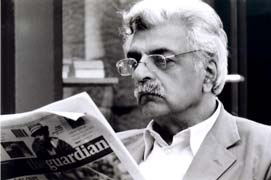
Tariq Ali
Tariq Ali was born in Indian Lahore in 1943, a city which was still under British colonial rule before becoming part of Pakistan in 1947. Threatened with years of imprisonment after having organised public demonstrations as part of a student organisation against the military dictatorship, he saw himself forced to immigrate to England. He studied Politics and Philosophy at Oxford and was the first Pakistani elected as President of the Oxford University Student Union. During the Vietnam War his participation in public debates with such personalities as Henry Kissinger and Michael Stewart brought him political recognition. In 1966 he became a member of the Bertrand Russell Peace Foundation, for which he travelled to war zones and regions of conflict. He soon became one of the leading mentors and spokesmen of the English student revolt of 1968. Since then he has been a contributing editor to the »New Left Review«, one of the most important independent newspapers of the international Left.
Ali also emerged as a filmmaker and writer, whose themes focused continuously on the conflict between Western societies and his own Islamic homeland. As »border crosser between the Western and Arab worlds« , in the words of Daniel Cohn-Bendit, »he understands better than anyone the conflict of either side, and their historical roots.« After the publication of his first novel, »Redemption« (1991), a satirical account of the extreme Left in Europe, and shaken by the first Gulf War, he embarked on a five-volume cycle of novels about Islam. »Shadows of the Pomegranate Tree« (1992) tells the story of the decline of Muslim civilisation in Spain. The book has been translated into many languages and represented Ali’s literary breakthrough. The fourth and most recent book in the series, »A Sultan in Palermo« (2005), is a historical novel set in the Twelfth Century, in the court of the Norman king Roger II in a Muslim-shaped Sicily. Weaved into the history of this Christian monarch, whose end paves the way for an era of intolerance between Muslims and Jews, is the life story of Abu Abdullah Muhammad al-Idrisi, the great scholar, cartographer, geographer and doctor.
The attacks of September 11 in 2001 drove Ali to publish the book of essays »The Clash of Fundamentalisms« (2002). The controversial statements he put forth sparked a wide debate. He suggests that »today two fundamentalisms stand face to face, the religious and the imperialist.« In 2003 he published an equally critical and articulate response to the war in Iraq. »Bush in Babylon« denounces the attempts of the occupying force to turn Iraq into a tributary for key resources and new markets. Ali publishes articles on the current political situation in the Middle and Far East in numerous international publications, among them the »Frankfurter Allgemeine Zeitung«, the »Süddeutsche Zeitung«, »taz«, »Financial Times« and »The Guardian«. The author lives in London.
© internationales literaturfestival berlin
The new revolutionaries; a handbook of the international radical left
Morrow
New York, 1969
Pakistan : military rule or people’s power
Morrow
New York, 1970
1968 and after : inside the revolution
Blond and Briggs
London, 1978
Trotzky für Anfänger
Rowohlt
Reinbek, 1980
[Ü: Niko Hansen]
Can Pakistan survive? : the death of a state
Penguin
Harmondsworth, 1983
Die Nehrus und die Gandhis: Eine indische Dynastie
Ullstein
Frankfurt/Main, 1985
[Ü: Erwin Duncker, Martin Pfeiffer]
Moskauer Gold
Rowohlt-Theater-Verlag
Reinbek, 1990
[Ü: Alexander F. Hoffmann und Hannelene Limpach]
Im Schatten des Granatapfelbaums
Diederichs
München, 1994
[Ü: Margarete Längsfeld]
Fear of Mirrors
Arcadia Books
London, 1998
Das Buch Saladin
Diederichs
München, 1998
[Ü: Petra Hrabak u.a.]
Ugly Rumours. An Instant Playscript.
Nick Hern Books
London, 1998
Street Fighting Years: Autobiographie eines ´68ers
Neuer ISP-Verlag
Köln, 1998
[Ü: Monika Claus-Feikert ]
Die steinerne Frau
Hugendubel
Kreuzlingen, 2001
[Ü: Petra Hrabak u.a.]
Fundamentalismus im Kampf um die Weltordnung
Hugendubel
München, Kreuzlingen, 2003
[Ü: Gabriele Gockel u.a. ]
Bush in Babylon
Heyne
München, 2005
[Ü: Norbert Juraschitz, Ursel Schäfer]
Der Sultan von Palermo
Hugendubel
München, Kreuzlingen, 2005
[Ü: Ursula Pesch, Karin Schuler ]
The Dictatorship of Capital
Verso
London, 2005
Conversations with Edward Said
Seagull
Calcutta, 2005
Speaking of Empire and Resistance: Conversations with Tariq Ali;
by Tariq Ali, David Barsamian
The New Press
New York, 2005
Rough Music: Blair, Bombs, Baghdad, London, Terror
Verso
London, 2006
The Leopard and the Fox : A Pakistani Tragedy
Berg
Oxford, 2006
Piraten der Karibik: Die Achse der Hoffnung
Hugendubel
Kreuzlingen, 2007
[Ü: Michael Beyer]
Übersetzer: Michael Beyer, Erwin Duncker, Gabriele Gockel, Petra Hrabak, Norbert Juraschitz, Margarete Längsfeld, Ursula Pesch, Martin Pfeiffer, Ursel Schäfer, Gerlinde Schermer-Rauwolf, Karin Schuler, Sonja Schumacher, Rita Seuß, Robert A. Weiß
